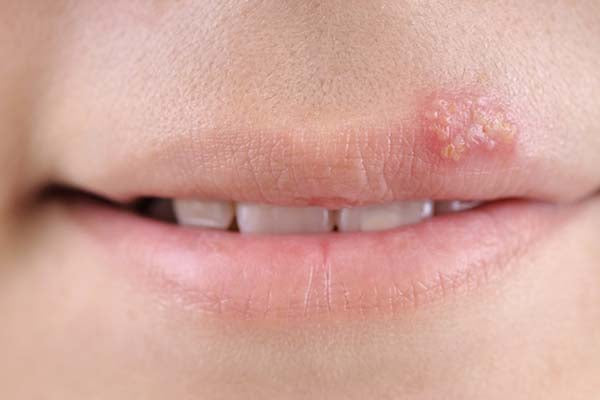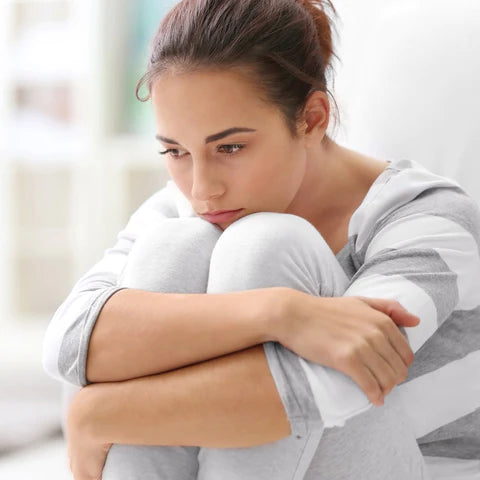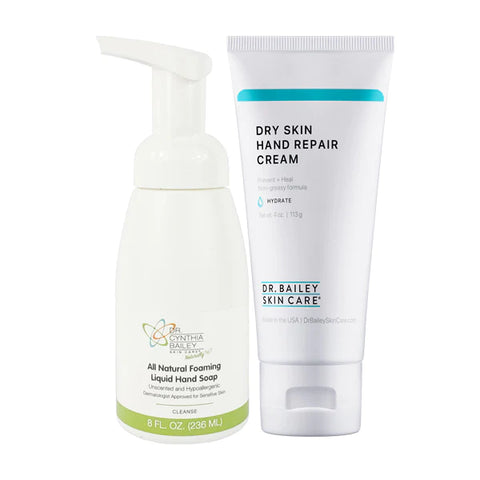Cold Sores or Fever Blisters? They're One and the Same!

Cold sores or fever blisters? Well, they are one and the same thing. Yep, one of the most pesky facial skin blemishes is the notorious cold sore, aka fever blister. It has two names but it's the same thing.
The placement of this common 'sore' is awkward, uncomfortable, and painfully obvious to anyone when you speak. Over time, many people become self-conscious and devise creative methods to cover their mouths or hide the sore. Unfortunately, unlike many other skin blemishes, it is not advisable to cover up a cold sore with makeup.
Even if you are determined to try and cover up the embarrassing sore, the crust and scab make it difficult. It may seem contradictory to call the same virus by "cold" and "hot (fever)" monikers, but understanding the cause of a cold sore flare up will reveal why it is often referred to by both names.
What Are Cold Sores?
Cold sores are viral infections: Herpes Simplex Virus (HSV) Type I and II. In general, HSV-1 infects oral areas while HSV-2 infects genital areas. However, both types can be found in either area or other parts of the body with mucous membranes or skin.
Transmission of the herpes virus that causes a cold sore occurs via virus-containing fluids (saliva), respiratory droplets, or contact with an open sore (mucous membranes).
Once you contract HSV you have it for life, for better or worse.
What do cold sores look like?
Cold sores first present as a cluster of blisters on a red and sore area of skin.
They can appear,
- both outside and inside the mouth, and
- on or in the nose.
Within a few days the blisters weep, pop, and crust over.
What does a cold sore feel like?
The area of skin with a cold sore (fever blister) can be highly sensitive; it can feel warm, itch, or burn before or during the eruption of the cold sore.
Also, especially during the first infection, you may also experience other symptoms such as fever, malaise, headaches, or swollen lymph nodes.
How long does a cold sore last?
Cold sores typically last 2 to 6 weeks.
Why do cold sores and fever blisters come back?
The recurrent episodes of cold sores are related to the method of their infection. Upon initial transmission, the virus travels up your sensory nerves and embeds itself at the root. It will remain dormant until "reactivated," and travel back down the peripheral nerve to the initial site of infection.
Not only do you have to deal with another embarrassing and painful cold sore, but also it will keep occurring in almost the exact same spot! This spot can become scarred over time.
Surprising FAQ about cold sores:
What is surprising is that many people have HSV, but it will never manifest symptoms, while others have the unfortunate luck to have recurrent visible cold sores. Essentially there is no rhyme or reason to who will develop cold sores once infected, but if you have ever had one, you will want to know how to manage the symptoms or make it less painful.
What Causes Cold Sores to Flare Up?
Once you are infected with HSV, a cold sore can be triggered by a variety of causes. You may be able to determine your trigger. In particular, a systemic infection such as a cold or fever may occur before the onset of a cold sore, hence the dual names. Below is the short list of cold sore triggers:- UV sunlight: Be sure to apply sunscreen on your lips!
- Trauma: Injury, sunburn, dry skin, dental procedures, chemical skin peels, or laser treatments on the area
- Food allergies
- Menses or Menopause: Hormonal shifts
- Systemic infections
- Immunosuppression: Chemotherapy or diseases that attack the immune system. Click here to read Dr. Bailey's chemotherapy skin care tips that can be applied for the lip care as well.
- Stress and Fatigue
How Do I Treat Cold Sores?

One of the ways to treat cold sores is through preemptive measures that prevent them. By managing the things that trigger your cold sores, you can possibly prevent an outbreak. Cold sores are often triggered by illness (hence the term 'fever blister'), sun exposure and stress.
Tips to prevent cold sores:
- wear sunscreen on your lips (sun triggers cold sores),
- maintain lip moisture during dry weather (winter, desert, etc.),
- get your flu shot,
- reduce stress in your life, and
- get plenty of rest are few ways to prevent reactivating a cold sore.
Keep your lips hydrated, healthy and sun protected to help prevent cold sores.
A great way to maintain lip moisture is applying a richly hydrating lip balm such as our Natural Lip Balm or white petrolatum.
A great healing lip SPF is VaniCream Lip Protectant. It is free of chemical sunscreens, protecting lips from sun with mineral sunscreens and chapping with a barrier formula.
Keep tubes of both around so that they are convenient and you can use them many times a day.
Also, inform your dentist or skin care professional if have cold sores, so they may adjust the procedure or put you on medicine to prevent a cold sore before your procedure.
How to you treat the symptoms of cold sores and fever blisters?
Another way to treat a cold sore is through symptom management. This ranges from pain relief to use of medications to decrease the severity or length of time a cold sore is present. It is important to discuss with your medical provider what treatment is best for you, especially since most medications require a prescription.
- Mild antiseptic mouthwash: as a disinfectant
- Numbing creams: lidocaine, corticosteroid cream
- Antiviral agents: Zovirax (acyclovir), Valtrex (valacyclovir), and Famvir (famciclovir) will help prevent pain, itchiness, or burning associated with cold sores, can shorten the time that the sore lasts, and if taken early enough may prevent the virus from multiplying into a full-blown cold sore.
- Natural remedies: spirits of camphor for anti-inflammatory effects, wet compresses for pain relief
How Do I Prevent Transmitting/Contracting HSV?
In general, during HSV's latent phase, you are not susceptible to contraction or able to transmit the virus. You are only contagious when you have a visible sore, especially when it is open. If you have a visible sore or see a friend/family member with a visible sore practice the following:- Do not share drinks, utensils, lipstick or lip balm, toothbrushes, or anything that comes into contact with your lips.
- Avoid direct contact: no kissing or touching with your fingers. You can pass the infection to other mucous membrane areas of the body or skin if the infection is on your hands.
- Practice good hand hygiene: as with any contagious infection, you should always monitor your hand washing to decrease the chance of possible transmission. Check out Dr. Bailey's tips on hand washing including her Natural Foaming Hand Soap and great Hand Cream in her Survival Kit for Busy Hands to prevent chapped hands developing due to your very important excellent hand hygiene.
The bottom line with cold sores:
Even though cold sores can be pesky, embarrassing, and unflattering, there are methods to reduce the appearance and to prevent passing the infection on to others. Currently scientists are developing a vaccine for cold sores, but nothing is on the market yet. If you suffer from HSV, share the tricks that work best for you below. Also, if you have any other questions about how cold sores work or prevention ask below in the comments or on our Facebook page.
Written by: Angela

Angela is a nursing student that is just few months away from getting her RN license! In her previous life she was a chemical engineer, and is a bit of a nerd when it comes to science like Dr. Bailey. She has been part of the Dr. Bailey Skin Care Team for the past two years now and is very passionate about the field of dermatology and skin care. Currently she works on a Burn ICU learning how to treat severe trauma to the skin. If she manages to take a break from her hectic school/work schedule, she enjoys knitting fancy scarves and hats for her friends, camping or backpacking in the great outdoors, and finding new local restaurants and microbrews to satisfy her inner "foodie."
References:
Huether, Sue E., and Kathryn L. McCance. Understanding Pathophysiology. Fifth ed. St. Louis, MO: Mosby/Elsevier, 2012. Print.
Lewis, Sharon L., RN, PhD, FAAN, Shannon Dirksen, RN, PhD, FAAN, Margaret Heitkemper, RN, PhD, FAAN, Linda Bucher, RN, PhD, CEN, CNE, and Mariann M. Harding, RN. PhD, CNE. Medical- Surgical Nursing: Assessment and Management of Clinical Problems. Ninth ed. St. Louis: Elsevier, Mosby, 2014. Print.


